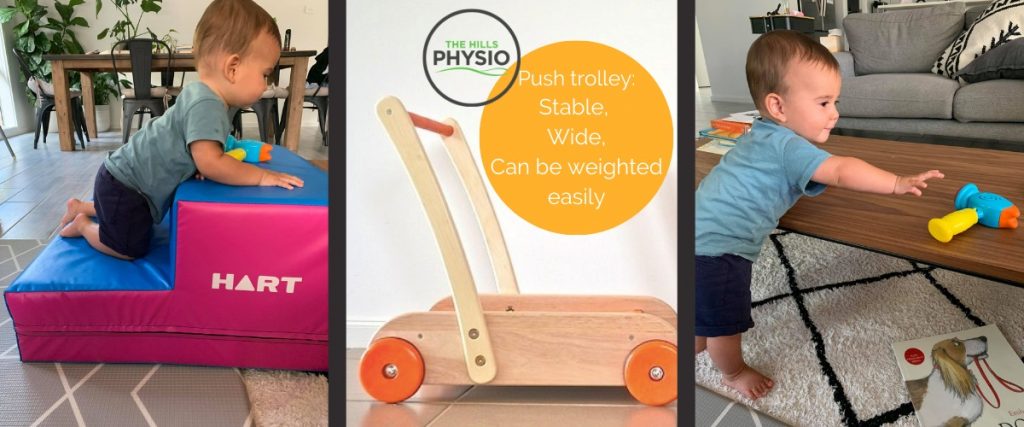Your baby’s first year is an exciting time, marked with so many special milestones and it’s hard not to compare your child with others. It’s also completely normal to worry a little if you feel like they’re not developing ‘normally’. The team at The Hills Physio sees lots of parents who are worried their babies won’t be walking by their first birthday so they’ve outlined below the expected gross motor skills for 12 months, strategies to encourage your child to walk independently and when and how to seek help.
What are considered ‘normal’ gross motor skills at 12 months?
Babies all develop at different rates, and they each have their own areas of strength as well as weaknesses. While one child may start walking at 9 months but not say their first word until 14 months, another child may have 20 words by 12 months but not walk until 15 months. Both children are considered to fall within the normal range of development for their age.
At 12 months of age, we would expect a child to have already mastered the skills of rolling, independent sitting, moving in and out of sitting, crawling, pulling to stand, lowering themselves from a standing position, standing with support, cruising around furniture and taking steps with hands help. Some children may also be walking well with hands held, walking with the use of a push walker or trolley, taking a few steps along/between furniture/a wall, walking independently and attempting to run.
New walkers will fall often, and frequent falling can be expected to continue for up to 6 months after a child learns to walk. Less frequent falling can be expected to continue for up to 2-3 years after a child learns to walk.
When should my child be walking by?
Most toddlers will be walking independently by 18 months of age.
How can you help my 12 month old learn the skill of walking?
- encourage playing in standing rather than sitting
- encourage your child to pull to stand by placing toys on a higher surface (between 25-45cm, the height of a step or a low coffee table)
- encourage your child to take steps along furniture by placing toys out of their arms reach
- weigh down a trolley or push walker to offer more stability, this will help the child that is hesitant with taking steps on the trolley
- encourage them to continue to crawl and climb over different surfaces (a mattress, over a pillow, up a soft step, over a climbing gym)
- avoid using jolly jumpers, sit in walkers and other similar items for long periods of time. These do not encourage good motor patterns and make it more difficult for your child to learn independent walking

When should you be concerned and what should I do about it?
By 12 months, it would be beneficial to seek support if your child is not yet rolling, sitting independently, crawling and standing with support. If your child is 14-16 months and does not show any signs or interest in independent walking, it is also beneficial to seek support. A paediatric physiotherapist can assist by first assessing your child to determine where their gross motor development is up to, consider any underlying causes for delay and then providing you with strategies and activities that you can do at home to encourage their development. Your physiotherapist will then see you for follow up appointments every 2-4 weeks to monitor progress and provide further home exercises/activities.
The bottom line: Don’t stress about your baby not walking for their 1st Birthday party, and don’t let others make you feel bad either. Children develop in lots of different ways. Give a few of the tips above a go, and when in doubt, reach out to a professional for advice/help. We are always happy to help, and it never hurts to ask.
You can meet the Hills Physio team by visiting thehillsphysio.com.au or alternatively you can phone (02) 9629 4608 and ask to speak to one of the paediatric physiotherapists directly.

